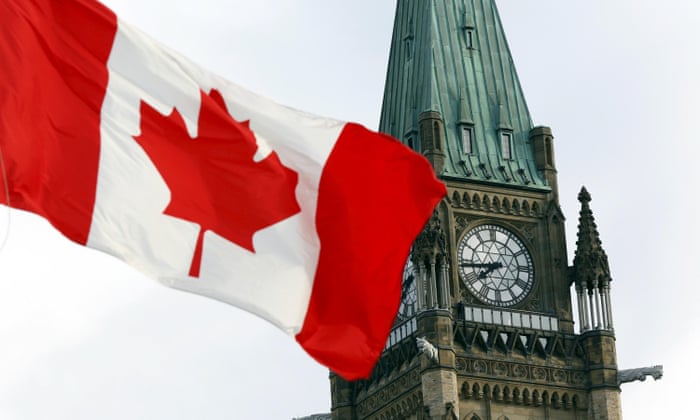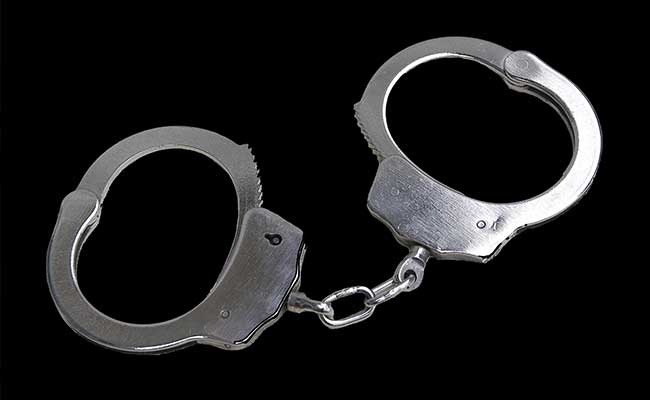Four charged in Canada with selling stolen satellite equipment to China
Federal police have charged an American, a Briton and two Canadians with violating export laws by passing on sensitive technology

The two-year probe also involved the Canadian Space Agency, the military, the US Department of Homeland Security and the FBI. Photograph: Blair Gable/Reuters
Tuesday 1 March 2016

 Canadian federal police has charged an American, a Briton and two Canadians with stealing sensitive satellite imaging technology and selling it to China in violation of export laws.
Canadian federal police has charged an American, a Briton and two Canadians with stealing sensitive satellite imaging technology and selling it to China in violation of export laws.


Canadian federal police have charged an American, a Briton and two Canadians with stealing sensitive satellite imaging technology and selling it to China in violation of export laws.
Two of them stole a sensor from their employer Teledyne Dalsa of Waterloo, Ontario, with help from a former employee, according to the Royal Canadian Mounted Police.
They sold it to two Chinese firms, one of them state-owned, in violation of the Canadian Controlled Goods Program and other laws.
The fourth accused works for one of the Chinese companies allegedly involved in the scheme.
The microelectronics were “intended for space satellite use”, the RCMP said in a statement.
“This investigation is an example of foreign governments having an interest in Canadian-based controlled technology and it highlights the RCMP’s commitment to keeping Canadian’s safe from the potential misuse of that technology,” said RCMP Superintendent Jamie Jagoe.
The two-year probe also involved the Canadian Space Agency, the military, US homeland security and the FBI.
Canadians Arthur Xin Pang, 46, and Binqiao Li, 59, were arrested and charged with more than a dozen related crimes including theft, fraud and possession, and transfer of controlled goods contrary to the Defense Production Act.
The RCMP said both were due in a Waterloo court for a bail hearing on Monday.
Arrest warrants were issued for Nick Tasker, 62, of Britain, and Hugh Ciao, 50, of California, who is currently in China.
Michel Juneau-Katsuya, former Asia-Pacific bureau chief for the Canadian Security Intelligence Service, said Canada’s knowledge-based, hi-tech sectors were a prime target for corporate espionage, which he estimated cost the economy about $100bn annually.
Canadian companies, the government and national security agencies were not doing enough to tackle the problem, he said.
“We have weak laws, law enforcement is ill equipped, the government does not assume leadership and, at the end of the day, the general population and business leaders aren’t aware of what’s going on,” he said.
Teledyne Dalsa, a tech company that specializes in digital imaging, circuit and electronic technology software, has offices in Canada, the US, Europe, and Asia.
Jason VanWees, a senior vice-president with the company, told the Guardian that “any kind of corporate espionage is a concern and that’s why when we detected it, we let people know”. He declined to comment further on the matter to the Guardian on Monday.
The RCMP said the company cooperated fully with the investigation, which was launched in early 2014 after Teledyne Dalsa’s complaint with the force.
Canada has seen a number of high-profile corporate espionage incidents in the past.
Telecommunications giant Nortel Network’s 2009 collapse and bankruptcy has been linked to its targeting for years by hackers allegedly operating out of China.
In 2014 the Canadian government pointed to a “highly sophisticated Chinese state-sponsored actor” as being responsible for hacking into computers at the National Research Council of Canada, a federal research and development body.
Canada has a domestic industrial security programme – the controlled goods programme – that aims to strengthen the country’s defence trade controls and prevent the proliferation of strategic assets including satellite GPS systems and communications equipment.
No comments:
Post a Comment
Comments always welcome!